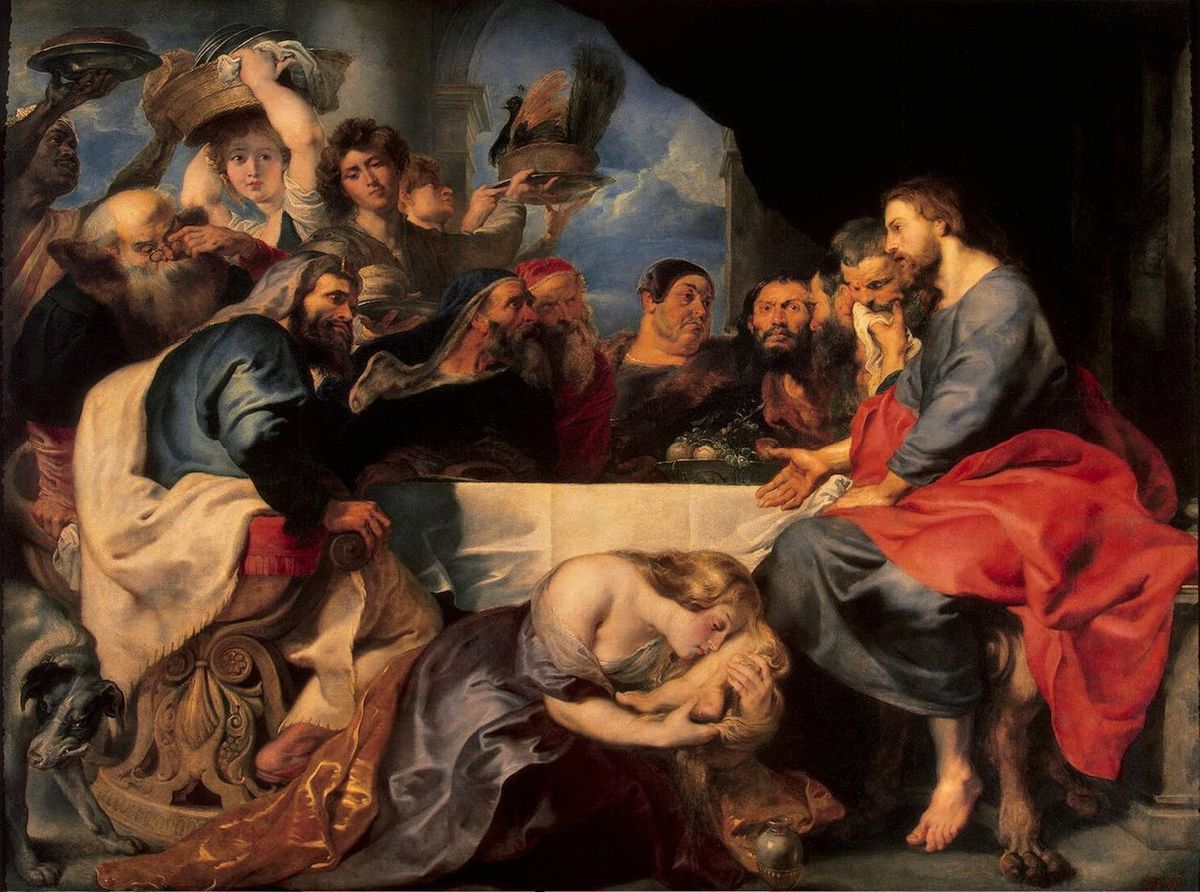We often think about sin as extravagance. The sinner is the one who drinks too much, gambles too much, who desires pleasure too much. On the 11th Sunday of Ordinary Time, we consider the stinginess of the sinner. The sinner who loves not enough.
The Gospel from Luke is rich in drama. Jesus is dining at table with a Pharisee when a sinful woman enters the home. We do not know the nature of the sin, but we know that it was known by all those assembled at table that day. It was public.
She enters the house, washes Jesus’ feet with her tears, and anoints him with oil. Here, the sinful woman joins in the work of public penance performed by King David. David recognizes his sins and calls out to God for forgiveness. He lays on sackcloth through the night: “Lord, forgive the wrong I have done” (Ps 32:5c). David does penance extravagantly. The unnamed woman does penance extravagantly.
Simon is stingy: “‘If this man were a prophet, he would know who and what sort of man this is who is touching him, that she is a sinner’” (Lk 7:39). Doesn’t Simon know that Jesus came to forgive the sins of all? That Jesus came as the extravagant pardoner, offering mercy to those who ask for it? That Jesus is the one who can blot out all our offenses? That this is the prophet’s role?
He doesn’t. But he learns. Jesus tells a parable meant to demonstrate the extravagant mercy of God offered even to the prodigal sinner. The ones who owe more are the ones who will have the most gratitude. Their extravagant sin will lead to extravagant love. Love that pushes one to wash feet with tears, to anoint with oil. Extravagant stuff.
Jesus doesn’t stop here. He reminds Simon that he is the one who has failed to show extravagant love. He may be ritually clean but his heart is disordered: “‘When I entered your house, you did not give me water for my feet, but she has bathed them with her tears and wiped them with her hair . . . her many sins have been forgiven because she has shown great love’” (Lk 7:44, 47).
Simon fails to greet the Savior of the world, the prophet of God come to proclaim the Good News of salvation. The sinful woman meets Jesus as king and spouse, Lord of all the earth. It is Simon who is the great sinner. Simon, who fails to love. Simon, who is invited to repent. To the sinful woman, Jesus proclaims the Good News: “‘Your faith has saved you; go in peace’” (Lk 7:50).
As a reader, you may think to yourself, “Good, Simon has gotten what he deserves.” But we don’t hear the rest of the story. Maybe this was the moment that changed Simon’s life. Maybe years later, he finds himself reading along with St. Paul’s letter to the Galatians: “I have been crucified with Christ” (Gal 2:19). Maybe the sinful woman changed his life. Forced him to encounter the gratuity of God’s mercy.
The Church, as the redeemed body of sinners, is both the sinful woman and Simon. Do we not need to wash our Lord’s feet with our tears, to show hospitality to Jesus Christ still dwelling among us? Still greeting us through the poor? Through those on the margins?
The mercy of God is still available to us, just as it was to both Simon and the sinful woman. We need to only check our self-satisfied pride at the door and run to the feet of our beloved Jesus. And get to washing.
That may seem extravagant. But God’s mercy normally is. It’s sin that’s stingy.
EDITORIAL NOTE: This article originally appeared in Our Sunday Visitor: Newsweekly on June 1, 2016 and is reproduced here with the permission of the publisher.
